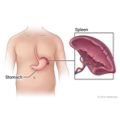Our Health Library information does not replace the advice of a doctor. Please be advised that this information is made available to assist our patients to learn more about their health. Our providers may not see and/or treat all topics found herein.
Laparoscopy
Test Overview
Laparoscopy (say "lap-uh-ROSS-kuh-pee") is a type of surgery that uses very small cuts. These cuts are called incisions.
The doctor puts a lighted tube through incisions in your belly. This tube is called a scope. Then the doctor puts special tools through the tube to do the surgery.
The surgery may be done to diagnose a condition, repair or remove an organ, or see if cancer has spread.
For some surgeries, you can usually go home the same day.
The incisions from the surgery usually leave several scars about half an inch long.
Why It Is Done
Laparoscopy is done to:
- Check for and possibly take out abnormal growths (such as tumors) in the belly or pelvis.
- Check for and treat conditions such as endometriosis, ectopic pregnancy, or pelvic inflammatory disease (PID).
- Find conditions that can make it hard for a woman to become pregnant. These conditions include cysts, adhesions, fibroids, and infection. Laparoscopy may be done after early infertility tests do not show the cause for the infertility.
- Do a biopsy.
- See if cancer in another area of the body has spread to the belly.
- Check for damage to internal organs, such as the spleen, after an injury or accident.
- Do a tubal ligation.
- Fix a hiatal hernia or an inguinal hernia.
- Take out organs, such as the uterus, spleen, gallbladder (laparoscopic cholecystectomy), ovaries, prostate, or appendix (appendectomy). Partial removal (resection) of the colon also can be done.
- Find the cause of sudden or ongoing pelvic pain.
How To Prepare
Surgery can be stressful. This information will help you understand what you can expect. And it will help you safely prepare for surgery.
Preparing for surgery
- You may need to empty your colon with an enema or laxative. Your doctor will tell you how to do this.
- Be sure you have someone to take you home. Anesthesia and pain medicine will make it unsafe for you to drive or get home on your own.
- Understand exactly what surgery is planned, along with the risks, benefits, and other options.
- Tell your doctor ALL the medicines, vitamins, supplements, and herbal remedies you take. Some may increase the risk of problems during your surgery. Your doctor will tell you if you should stop taking any of them before the surgery and how soon to do it.
- If you take a medicine that prevents blood clots, your doctor may tell you to stop taking it before your surgery. Or your doctor may tell you to keep taking it. (These medicines include aspirin and other blood thinners.) Make sure that you understand exactly what your doctor wants you to do.
- Make sure your doctor and the hospital have a copy of your advance directive. If you don't have one, you may want to prepare one. It lets others know your health care wishes. It's a good thing to have before any type of surgery or procedure.
How It Is Done
Laparoscopy is done by a surgeon or a doctor of women's health (gynecologist). General anesthesia is most often used. But other types of anesthesia, such as spinal anesthesia, may be used. Talk with your doctor about what choice is best for you.
About an hour before the surgery, you will empty your bladder. You will get fluids and medicine through an intravenous (I.V.) in a vein in your arm. You may get a medicine (sedative) to help you relax.
Several procedures may be done after you get your anesthesia and are relaxed or asleep.
- An airway will be placed in your throat to help you breathe if you get general anesthesia.
- A thin flexible tube (urinary catheter) may be put through your urethra into the bladder.
- Some of your pubic hair may be shaved.
- Your belly and pelvic area will be washed with a special soap.
- For women, your doctor may do a pelvic exam before putting a thin tube (cannula) through your vagina into the uterus. The cannula lets your doctor move your uterus and ovaries to get a better look at the belly organs.
During laparoscopy, a small incision is made in the belly. More than one incision may be made if other tools will be used during the surgery. A hollow needle is put through the first incision. Then air is slowly put through the needle to inflate the belly. The air lifts the abdominal wall away from the organs inside so your doctor can see clearly.
A thin, lighted tube (laparoscope) is then put through the incision to look at the organs. Other tools can be used to take tissue samples, fix damage, or drain cysts. A laser may be attached to the laparoscope to help with the surgery.
After the surgery, all the tools will be removed and the air will be released. The incisions will be closed with stitches and covered with a bandage. The scar will be very small and will fade over time.
After the laparoscopy, you will go to the recovery room. How long you stay will depend on why you had the surgery.
How long the test takes
Laparoscopy usually takes about 30 to 90 minutes, depending on what is done. But it can take longer in certain situations.
How It Feels
If general anesthesia is used, you will be asleep and feel nothing. After you wake up, you will feel sleepy for several hours. You may be tired and have some pain for a few days after a laparoscopy. You may have a mild sore throat from the tube in your throat to help you breathe. Use throat lozenges and gargle with warm salt water to help your sore throat. After a laparoscopy, you may have shoulder pain. This is caused by the air your doctor put in your belly to help see your organs better. The pain may last for a day or two.
If you have other types of anesthesia, you may have pain for a few days when the initial numbness wears off.
Risks
There is a small chance of problems from laparoscopy, such as:
- Bleeding from the incisions.
- Infection.
- Damage to an organ or blood vessel. This may cause more bleeding that needs another surgery to repair.
A laparoscopy may not be done because of a higher chance for problems if you have:
- Abdominal cancer.
- An abdominal hernia.
- Had abdominal surgeries in the past.
Results
Results of any lab tests on tissue samples may not be available for several days.
Normal: | The organs are normal in size, shape, and position. |
|---|---|
Adhesions, cysts, or abnormal growths, such as tumors, are not seen. | |
No signs of disease (such as endometriosis), inflammation (such as appendicitis), or infection are seen. | |
Abnormal: | An organ may be abnormal in size, shape, or position. |
Adhesions, cysts, or abnormal growths, such as tumors, may be seen. | |
Signs of disease, such as endometriosis, or infection may be seen. | |
An ectopic pregnancy may be present. | |
Inflammation of an internal organ may be present, such as appendicitis, cholecystitis, or pelvic inflammatory disease (PID). | |
Scar tissue may be seen on an internal organ, such as the fallopian tubes. |
Related Information
Credits
Current as of: July 31, 2024
Author: Ignite Healthwise, LLC Staff
Clinical Review Board
All Ignite Healthwise, LLC education is reviewed by a team that includes physicians, nurses, advanced practitioners, registered dieticians, and other healthcare professionals.
Current as of: July 31, 2024
Author: Ignite Healthwise, LLC Staff
Clinical Review Board
All Ignite Healthwise, LLC education is reviewed by a team that includes physicians, nurses, advanced practitioners, registered dieticians, and other healthcare professionals.
This information does not replace the advice of a doctor. Ignite Healthwise, LLC disclaims any warranty or liability for your use of this information. Your use of this information means that you agree to the Terms of Use and Privacy Policy. Learn how we develop our content.
To learn more about Ignite Healthwise, LLC, visit webmdignite.com.
© 2024-2025 Ignite Healthwise, LLC.








